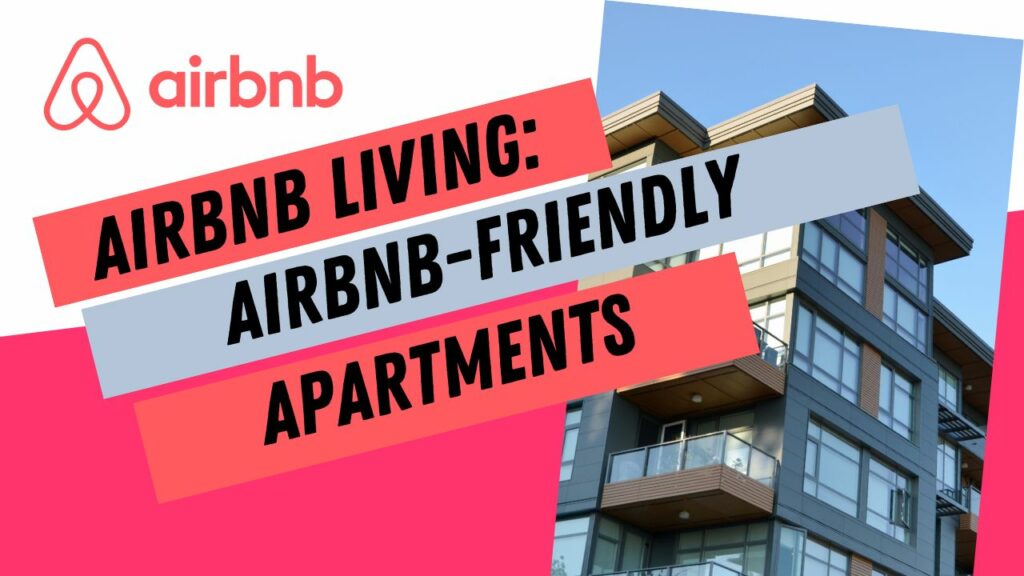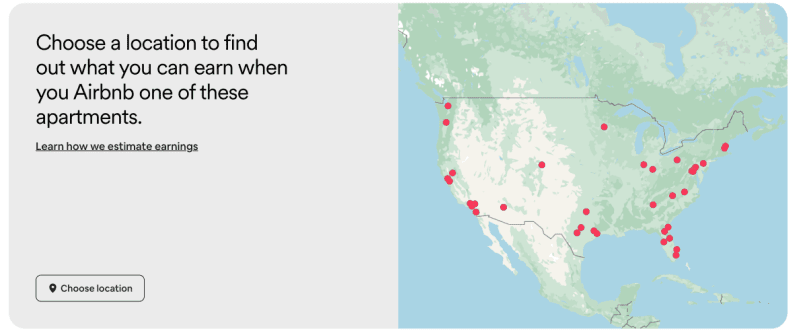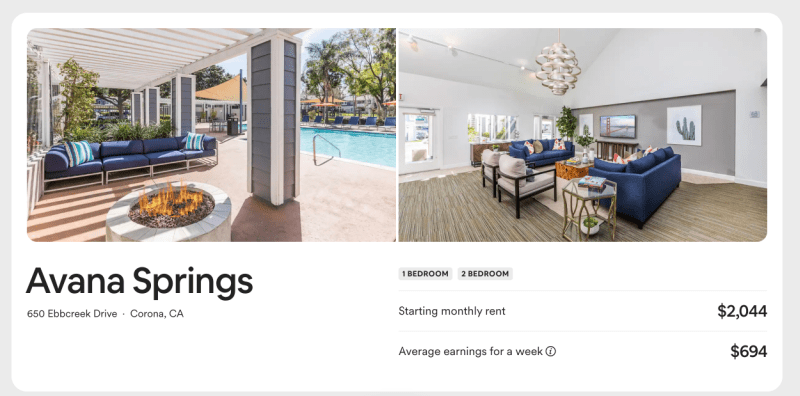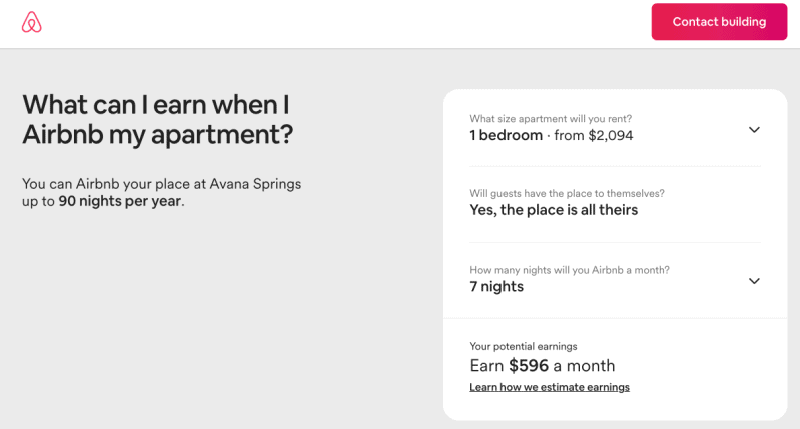Introduction
Attention all short-term rental managers! If you still think Airbnb is solely a travel company operating a short stay marketplace, you’re in for a surprise. Airbnb has taken a bold step beyond its traditional business model, launching a new marketplace that caters to long-term tenants looking for Airbnb-Friendly Apartments. This exciting development may change the game for property managers and hosts alike. So, buckle up and get ready to explore the ins and outs of this innovative program that is redefining Airbnb’s role in the rental market.
How Airbnb-Friendly Apartments Work
Using the Airbnb-Friendly Marketplace
The Airbnb-friendly marketplace is designed to cater to occasional hosts and renters. To take advantage of this new platform, potential hosts need to follow a series of steps:
- Step 1: Discover Airbnb-friendly properties
Airbnb provides a dedicated section on its website for users to find Airbnb-friendly properties. These properties are pre-vetted and have agreements in place with landlords to allow short-term rentals. Users can search for these properties in various cities across the United States, making it easy to find a suitable location.
Current cities as of mid-April 2023:
Alexandria, Arlington, Atlanta Metro, Austin, Baltimore County, Charlotte, Cincinnati, Dallas, Denver, Essex County, Fairfax County, Foxborough, Gainesville, Galveston, Houston, Indianapolis, Jacksonville, Los Angeles, Miami, Minnetonka, Newport Beach, Orlando Metro, Philadelphia Metro, Phoenix, Pittsburgh, Portland, Raleigh, Riverside, Sacramento, San Antonio, San Diego, San Francisco Bay, Seattle Metro, Silicon Valley, Silver Spring, Tampa, West Palm Beach
- Step 2: Schedule a property tour
Once a potential host finds an Airbnb-friendly property, they can schedule a tour through Airbnb’s platform. This allows the host to visit the property and assess its suitability for hosting guests. Tours can be arranged at convenient times, ensuring a seamless experience.
- Step 3: Sign a contract with the landlord
After selecting a suitable Airbnb-friendly property, hosts will need to sign a contract with the landlord. This contract will outline the specific hosting rules for the building, such as the number of allowed guests, duration of stays, and any other building-specific regulations. By signing this contract, hosts agree to comply with these rules when renting out their apartments on Airbnb.
- Step 4: List the apartment on Airbnb
With a signed contract in hand, hosts can now list their apartments on Airbnb. They should ensure that their listings accurately reflect the building’s hosting rules and restrictions. This helps to maintain a positive relationship with the landlord and prevent any potential issues with other residents.
- Step 5: Host guests according to the building’s rules
Finally, hosts can start welcoming guests to their Airbnb-friendly apartments. It’s crucial to adhere to the building’s rules and guidelines while hosting, ensuring a smooth experience for all parties involved. This includes managing guest check-ins and check-outs, noise levels, and any other building-specific requirements.
By following these steps, hosts can successfully take advantage of Airbnb’s new marketplace for Airbnb-friendly apartments, providing a new option for occasional hosts and renters alike.
Airbnb’s Transformation: Introducing Airbnb Living
An Overview
Airbnb-friendly apartments are a new type of rental property that connects renters, landlords, and Airbnb. With the introduction of Airbnb Living, a subsidiary focusing on housing, Airbnb aims to provide a more customized hosting experience for renters and landlords.
Evolution from the Original Marketplace
Airbnb’s original marketplace was centered around short-stays for travelers. However, the new marketplace caters to occasional hosts and renters looking for a more flexible living arrangement. There are notable differences in supply, demand, and rules between the two marketplaces.
A Deep Dive into the Airbnb-Friendly Apartments Marketplace
Supply: Expanding the Range of Properties
The new marketplace operates in over 30 US cities and offers exclusive listings for occasional hosts. Airbnb aims to expand the market through partnerships and programs tailored to this new audience.
Demand: Targeting a New Audience
Airbnb’s new marketplace caters to renters seeking to offset their rent costs by occasionally hosting guests. It also attracts landlords and building owners looking for a more streamlined hosting experience. The marketplace aims to foster loyalty among occasional hosts by providing tailored solutions.
Rules: Creating a Customized Hosting Experience
With the implementation of the Airbnb Resident Hosting Program, specific hosting rules are set for each building. This ensures transparency and allows for income sharing between renters and landlords.
Key Programs and Partnerships in the New Marketplace
Airbnb Resident Hosting Program
The resident program plays a crucial role in the new marketplace by providing benefits for landlords, residents, and homeowners associations (HOAs). It also allows for more customized hosting experiences and guidelines.
Stakeholders in the Airbnb-Friendly Apartments Marketplace
Renters
The process of becoming a host in the new marketplace involves signing a contract with the landlord and sub-renting with their approval. Renters share a portion of their revenue with the landlords, ensuring a mutually beneficial arrangement.
Landlords and Building Owners
Landlords and building owners can benefit from participating in the new marketplace by increasing profitability, attracting renters, and improving resident satisfaction. They can also monitor hosting activity using a customized dashboard provided by Airbnb.
Airbnb and Airbnb Living
The new marketplace strengthens Airbnb’s position in the rental market and captures a new segment of customers. This move drives growth and allows the company to open a soft brand for housing through the subsidiary, Airbnb Living.
Pros and Cons for Stakeholders in the Airbnb-Friendly Apartments Marketplace
Tenants
For tenants participating in the Airbnb-friendly apartments program, there are both advantages and disadvantages to consider.
Pros
- Offsetting rent costs: One of the primary benefits of participating in the program is the ability to offset rent costs by hosting short-term guests. This additional income can help make living in desirable locations more affordable.
- Flexible living arrangements: By participating in the program, tenants can enjoy more flexible living arrangements. For example, they may choose to travel while renting out their apartment or have a spare room available for hosting guests when needed. This flexibility can be an attractive option for those looking for alternative living situations.
- Additional income: Beyond offsetting rent costs, participating in the Airbnb-friendly apartments program can provide tenants with an additional income stream. This income can be used for various purposes, such as saving for future goals or enjoying a higher quality of life.
Cons
- Sharing revenue with landlords: One potential downside of participating in the program is the need to share revenue with landlords. In some cases, tenants may be required to pay a percentage of their hosting income to the landlord or property management company, which can reduce the overall financial benefit.
- Adhering to specific hosting rules: As part of the Airbnb-friendly apartments program, tenants are required to follow specific hosting rules set by the landlord or building owner. These rules may include limits on the number of guests, restrictions on certain types of guests, or other guidelines that may not align with the tenant’s hosting preferences.
- Potential wear and tear on the property: Hosting short-term guests can lead to increased wear and tear on the property, which may result in additional maintenance costs or a reduced security deposit refund at the end of the lease. Tenants should carefully consider the potential impact on their living space before committing to the program.
While there are several advantages to participating in the Airbnb-friendly apartments program, tenants must also weigh the potential downsides. Understanding the specific rules and financial implications of the program can help tenants make informed decisions about whether it’s the right choice for their living situation.
Other caveats for Airbnb-Friendly apartment tenants:
It is crucial for tenants to understand the terms and conditions of both the Airbnb Marketplace and the Airbnb Resident Hosting Program. There are some important points that tenants should be aware of, which may not be immediately apparent without carefully reading the terms and conditions.
- Hosting Rules: Tenants must adhere to the specific hosting rules set by their building or community. These rules may include limitations on the number of nights a unit can be rented, the type of guests allowed, and any additional requirements for hosting.
- Insurance Coverage: Tenants should ensure that they have adequate insurance coverage for hosting guests. Airbnb provides its Host Guarantee, which may cover up to $1 million in damages, but it may not cover all types of damages or situations. Tenants should review their insurance policies and consider obtaining additional coverage if necessary.
- Taxes and Fees: Tenants are responsible for understanding and complying with any applicable tax regulations, including collecting and remitting occupancy taxes in their jurisdiction. Additionally, they should be aware of any fees associated with hosting, such as cleaning or management fees.
- Liability: Tenants must understand their liability when hosting guests. They should be aware of potential risks and take necessary precautions to ensure the safety of their guests and property.
- Termination: Tenants should familiarize themselves with the termination clauses in the Airbnb Resident Hosting Program’s terms and conditions. They should be aware of the circumstances under which their participation in the program may be terminated, and any consequences of such termination.
By being aware of these key points, tenants can better understand their responsibilities and obligations when participating in the Airbnb-friendly marketplace and the Resident Hosting Program. This knowledge will help them avoid potential issues and ensure a smooth hosting experience for all parties involved.
Landlords and Building Owners
Participating companies in the Airbnb-Friendly Apartments Program include Greystar, among others. These landlords and building owners can benefit from the new marketplace by increasing profitability, attracting renters, and improving resident satisfaction. They can also monitor hosting activity using a customized dashboard provided by Airbnb. However, there are also some potential drawbacks that should be considered.
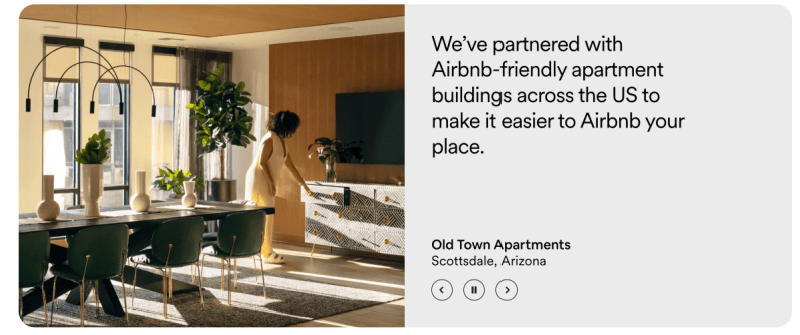
Greystar: A History of Cooperation with Airbnb
Airbnb and Greystar share mutual interests in creating a more welcoming environment for short-term guests within multi-family housing. This partnership aims to transform buildings that were previously hostile to random travelers into Airbnb-friendly establishments, benefiting both companies.
2019: Airbnb Acquires Urbandoor, Incubated by Greystar
In 2019, Airbnb acquired Urbandoor, a global online marketplace that connected professionals with furnished and serviced apartments tailored to their needs for extended stays. This acquisition aimed to strengthen Airbnb for Work’s engagement and emphasized the company’s focus on providing authentic, local experiences to guests, regardless of the length of their stay.
2023: Greystar Announces New Partnership with Airbnb
In 2023, Greystar announced a new partnership with Airbnb, joining several other property managers in a new listing service for rental apartments. Greystar added over 100 buildings to the Airbnb platform, with plans to expand the number in the future.
This collaboration between Greystar and Airbnb demonstrates the evolving relationship between the two companies, focusing on providing solutions for multifamily housing owners and operators. The incorporation of the Airbnb-Friendly Apartments Program creates an environment where being Airbnb-friendly is the norm. However, this may not always align with the preferences of long-term residents who dislike having strangers coming and going in their buildings. The challenge lies in striking a balance between the interests of the companies and the desires of the long-term residents.
Potential Cons for Landlords and Building Owners
While the Airbnb-Friendly Apartments Program offers several benefits to landlords and building owners, there are also potential downsides to consider:
- Impact on long-term residents: As mentioned earlier, long-term residents may not appreciate the influx of short-term guests in their buildings. This could lead to dissatisfaction among existing tenants, potentially causing higher turnover rates and increased vacancies.
- Additional management responsibilities: With more short-term guests, landlords and building owners may face increased management responsibilities such as addressing complaints, handling maintenance requests, and ensuring the property stays in compliance with local regulations.
- Risk of damage and liability: Short-term guests may be more likely to cause damage to the property or common areas, leading to higher repair and maintenance costs. Additionally, landlords and building owners may be held liable for any incidents that occur on the property involving short-term guests.
- Local regulations and legal concerns: Participation in the program may require compliance with local regulations surrounding short-term rentals, which can vary significantly by location. Landlords and building owners should be aware of and adhere to these regulations to avoid potential legal issues.
In summary, while the Airbnb-Friendly Apartments Program offers various benefits for landlords and building owners, it is crucial to weigh these advantages against the potential drawbacks and consider the impact on long-term residents before deciding to participate in the program.
Airbnb and Airbnb Living
As Airbnb moves beyond being solely a travel company and launches its subsidiary, Airbnb Living, it is essential to consider the advantages and disadvantages of this expansion.
Pros
- Expanding into a new market segment: By launching Airbnb Living, the company is tapping into a new market segment, catering to renters looking for longer-term stays and occasional hosting opportunities. This expansion allows Airbnb to reach a broader audience and generate additional revenue streams.
- Strengthening their position in the rental market: With Airbnb Living’s Airbnb-Friendly Apartments Marketplace, the company is solidifying its position in the rental market by offering more options for renters and property owners. This move can help Airbnb compete with traditional rental agencies and other online platforms focused on long-term rentals.
- Diversifying their offerings: Airbnb Living’s appartments allows the company to diversify its offerings by providing more than just short-term stays for travelers. With a focus on longer-term rentals, Airbnb can cater to various customer needs, including those looking for temporary housing during relocations or extended business trips.
Cons
- Potential backlash from traditional rental market stakeholders: As Airbnb expands into the long-term rental market, it may face backlash from traditional rental market stakeholders, such as real estate agents, property managers, and long-term tenants. They may view Airbnb Living as direct competition, leading to resistance or opposition.
- Increased complexity in managing multiple marketplaces: Operating both the original Airbnb marketplace and the new Airbnb-Friendly marketplace may lead to increased complexity in managing the two distinct services. The company will need to allocate resources to ensure both marketplaces run smoothly and address potential issues that may arise from catering to different customer segments.
- Possible regulatory challenges: As Airbnb continues to grow and expand into new markets, it may face additional regulatory challenges, especially in cities or countries with strict housing and rental regulations. The company will need to be proactive in addressing these challenges and working with local authorities to ensure compliance with all relevant regulations.
In conclusion, while Airbnb Living presents several opportunities for growth and diversification, the company must also navigate potential challenges and backlash from stakeholders in the traditional rental market. Balancing these pros and cons will be crucial for Airbnb as it continues to expand its offerings and solidify its position in the rental market.
Airbnb-Friendly Apartments Program: Alleviating or Aggravating the Housing Crisis?
The Airbnb-Friendly Apartments program has both positive and negative implications for the housing crisis.
On one hand, it could help alleviate the housing crisis in some aspects:
- Regulation: The program encourages more structured and regulated short-term rentals by partnering with property owners and landlords. This can help minimize the number of illegal rentals and ensure compliance with local laws and regulations.
- Control: By providing a specific platform for tenants to rent out their apartments, the program can potentially limit the number of entire properties being solely dedicated to short-term rentals, leaving more units available for long-term housing.
- Incentive for landlords: The program offers landlords a way to monetize their properties while still providing long-term housing. This could encourage more landlords to participate in the long-term rental market.
On the other hand, the program could potentially aggravate the housing crisis:
- Competition: By making it easier for tenants to rent out their apartments on Airbnb, the program might increase the overall supply of short-term rentals in the market, leading to more competition for long-term renters.
- Higher rent prices: The program could incentivize landlords to charge higher rents, as they would be able to profit from both long-term tenants and the additional income generated through short-term rentals.
- Reduced housing stock: If the program proves to be very profitable for landlords, they might convert more units into Airbnb-friendly apartments, reducing the overall stock of long-term housing.
In summary, the impact of the Airbnb-Friendly Apartments program on the housing crisis is not clear-cut. It has the potential to help alleviate some aspects of the crisis by encouraging regulation and control, but it could also potentially aggravate the situation by increasing competition for long-term renters and reducing the housing stock. The ultimate effect of the program will depend on various factors, including the extent of its adoption by landlords and tenants, as well as the specific rules and regulations governing short-term rentals in each jurisdiction.
Conclusion
Airbnb’s new marketplace for Airbnb-friendly apartments signifies a shift in the company’s focus, moving beyond its travel-centric origins. By introducing Airbnb Living’s apartments and catering to a new audience of occasional hosts and renters, Airbnb has successfully created a separate marketplace with different supply, demand, and rules. As short-term rental managers, it’s essential to keep an eye on these developments to stay ahead in the ever-changing rental market landscape.
Bonus: Background information about Airbnb-Friendly Apartments
Airbnb-friendly apartments have become increasingly popular in recent years, offering a convenient solution for short-term rentals in cities like San Diego, San Francisco, and beyond. These apartment buildings cater specifically to Airbnb guests and short-term renters, providing an attractive option for those seeking temporary accommodation. By participating in an Airbnb-friendly apartment program, building owners can tap into the lucrative short-term rental market while offering potential long-term renters a flexible leasing option.
Apartment complexes that are part of the Airbnb-friendly apartment program typically have less restrictive subletting rules, allowing tenants to rent out their units for short stays without violating their lease agreements. This arrangement benefits both tenants and building owners, as tenants can earn extra income while owners can attract more renters. In many cases, local laws and restrictions regarding short-term rentals are taken into account to ensure compliance.
Building managers and management companies play a crucial role in ensuring the success of an Airbnb-friendly apartment program. They work closely with building owners to ensure that the needs of both long-term residents and short-term renters are met. This may include providing amenities and services tailored to Airbnb guests, such as dedicated parking or concierge services.
To find Airbnb-friendly apartments, interested renters can explore sites like Airbnb and other short-term rental platforms, searching for properties specifically located within Airbnb-friendly buildings. In addition, they can directly contact apartment building owners or management companies to inquire about the availability of units within their properties.
However, not all cities and apartment buildings are equally open to short-term rentals. In some locations, local restrictions or building rules may limit the number of nights a tenant can sublet their apartment, or prohibit short-term rentals altogether. Prospective tenants should be aware of these restrictions and consult with their landlords or building managers before signing a lease.
In conclusion, Airbnb-friendly apartments offer a unique opportunity for renters and building owners alike. By capitalizing on the growing short-term rental market, these properties can generate additional income and attract a diverse range of tenants. As the popularity of platforms like Airbnb continues to grow, it is likely that more apartment buildings will adopt Airbnb-friendly programs and policies, further expanding the options available to short-term renters and hosts.

